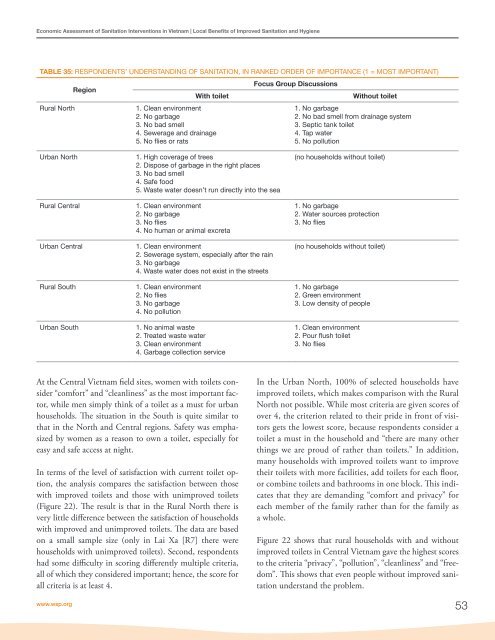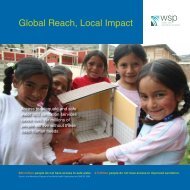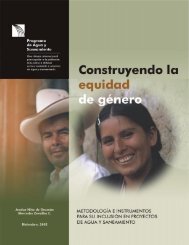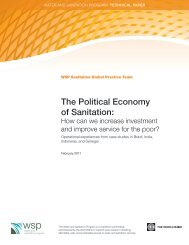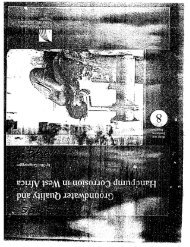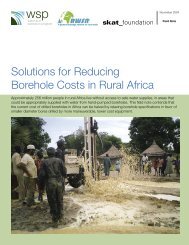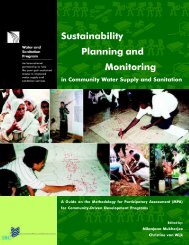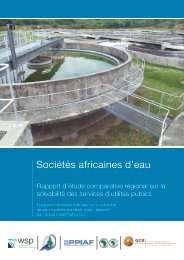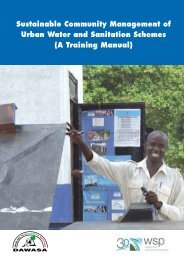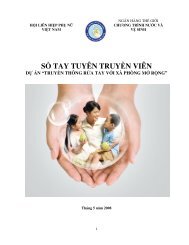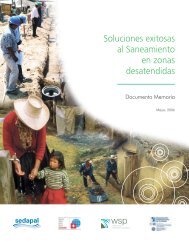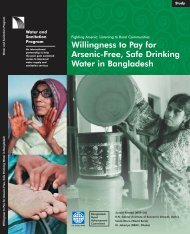Economic Assessment of Sanitation Interventions in Vietnam - WSP
Economic Assessment of Sanitation Interventions in Vietnam - WSP
Economic Assessment of Sanitation Interventions in Vietnam - WSP
Create successful ePaper yourself
Turn your PDF publications into a flip-book with our unique Google optimized e-Paper software.
<strong>Economic</strong> <strong>Assessment</strong> <strong>of</strong> <strong>Sanitation</strong> <strong>Interventions</strong> <strong>in</strong> <strong>Vietnam</strong> | Local Benefits <strong>of</strong> Improved <strong>Sanitation</strong> and HygieneTABLE 35: RESPONDENTS’ UNDERSTANDING OF SANITATION, IN RANKED ORDER OF IMPORTANCE (1 = MOST IMPORTANT)Rural NorthRegionWith toilet1. Clean environment2. No garbage3. No bad smell4. Sewerage and dra<strong>in</strong>age5. No flies or ratsFocus Group DiscussionsWithout toilet1. No garbage2. No bad smell from dra<strong>in</strong>age system3. Septic tank toilet4. Tap water5. No pollutionUrban NorthRural CentralUrban CentralRural SouthUrban South1. High coverage <strong>of</strong> trees2. Dispose <strong>of</strong> garbage <strong>in</strong> the right places3. No bad smell4. Safe food5. Waste water doesn’t run directly <strong>in</strong>to the sea1. Clean environment2. No garbage3. No flies4. No human or animal excreta1. Clean environment2. Sewerage system, especially after the ra<strong>in</strong>3. No garbage4. Waste water does not exist <strong>in</strong> the streets1. Clean environment2. No flies3. No garbage4. No pollution1. No animal waste2. Treated waste water3. Clean environment4. Garbage collection service(no households without toilet)1. No garbage2. Water sources protection3. No flies(no households without toilet)1. No garbage2. Green environment3. Low density <strong>of</strong> people1. Clean environment2. Pour flush toilet3. No fliesAt the Central <strong>Vietnam</strong> field sites, women with toilets consider“comfort” and “cleanl<strong>in</strong>ess” as the most important factor,while men simply th<strong>in</strong>k <strong>of</strong> a toilet as a must for urbanhouseholds. The situation <strong>in</strong> the South is quite similar tothat <strong>in</strong> the North and Central regions. Safety was emphasizedby women as a reason to own a toilet, especially foreasy and safe access at night.In terms <strong>of</strong> the level <strong>of</strong> satisfaction with current toilet option,the analysis compares the satisfaction between thosewith improved toilets and those with unimproved toilets(Figure 22). The result is that <strong>in</strong> the Rural North there isvery little difference between the satisfaction <strong>of</strong> householdswith improved and unimproved toilets. The data are basedon a small sample size (only <strong>in</strong> Lai Xa [R7] there werehouseholds with unimproved toilets). Second, respondentshad some difficulty <strong>in</strong> scor<strong>in</strong>g differently multiple criteria,all <strong>of</strong> which they considered important; hence, the score forall criteria is at least 4.In the Urban North, 100% <strong>of</strong> selected households haveimproved toilets, which makes comparison with the RuralNorth not possible. While most criteria are given scores <strong>of</strong>over 4, the criterion related to their pride <strong>in</strong> front <strong>of</strong> visitorsgets the lowest score, because respondents consider atoilet a must <strong>in</strong> the household and “there are many otherth<strong>in</strong>gs we are proud <strong>of</strong> rather than toilets.” In addition,many households with improved toilets want to improvetheir toilets with more facilities, add toilets for each floor,or comb<strong>in</strong>e toilets and bathrooms <strong>in</strong> one block. This <strong>in</strong>dicatesthat they are demand<strong>in</strong>g “comfort and privacy” foreach member <strong>of</strong> the family rather than for the family asa whole.Figure 22 shows that rural households with and withoutimproved toilets <strong>in</strong> Central <strong>Vietnam</strong> gave the highest scoresto the criteria “privacy”, “pollution”, “cleanl<strong>in</strong>ess” and “freedom”.This shows that even people without improved sanitationunderstand the problem.www.wsp.org53


